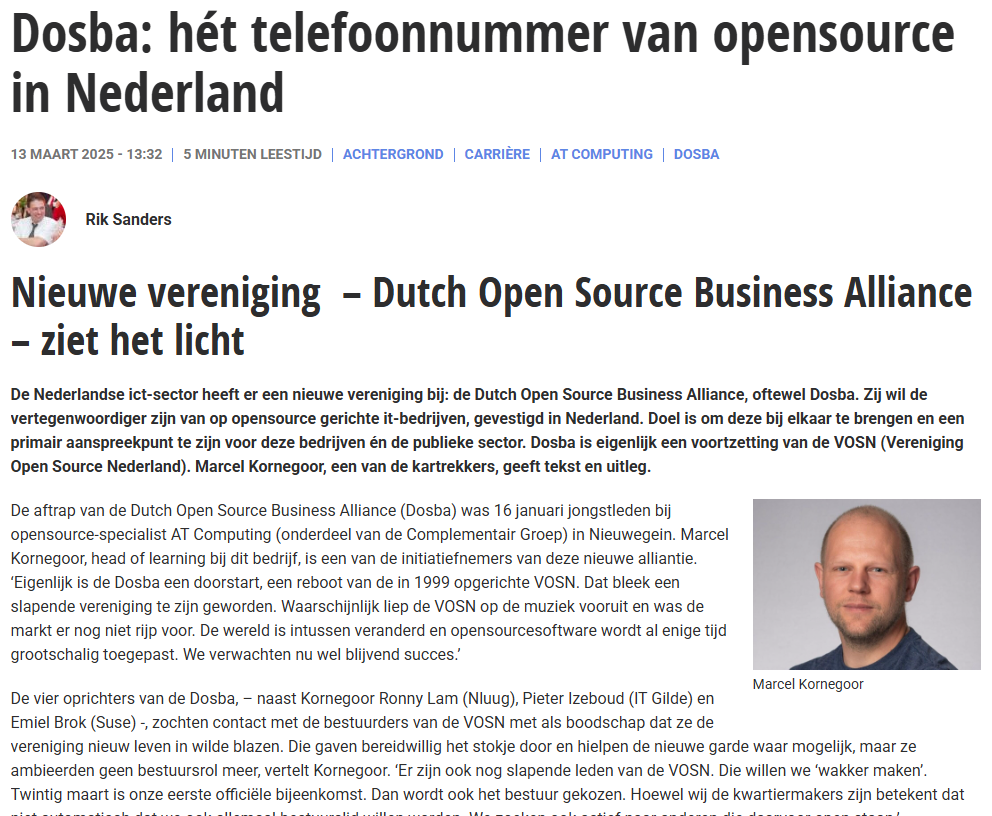
DOSBA in Computable
New Association – Dutch Open Source Business Alliance – Launched
The Dutch IT sector has gained a new association: the Dutch Open Source Business Alliance, or DOSBA. Its mission is to represent IT companies in the Netherlands that focus on open source. The goal is to bring these companies together and serve as a primary point of contact — both for the businesses themselves and for the public sector. DOSBA is essentially a continuation of VOSN (Vereniging Open Source Nederland). Marcel Kornegoor, one of the driving forces behind the initiative, explains more.
Marcel Kornegoor
The kick-off of the Dutch Open Source Business Alliance (DOSBA) took place on January 16 at open source specialist AT Computing (part of the Complementair Groep) in Nieuwegein. Marcel Kornegoor, Head of Learning at AT Computing, is one of the founders of this new alliance. "In essence, DOSBA is a reboot of VOSN, which was founded in 1999 but had become a dormant association. VOSN may have been ahead of its time, and the market wasn’t quite ready for it back then. The world has since changed. Open source software is now widely adopted, and we believe this time it will succeed for the long run."
The four founders of DOSBA — Kornegoor, Ronny Lam (Nluug), Pieter Izeboud (IT Gilde), and Emiel Brok (SUSE) — reached out to the former VOSN board to propose revitalizing the association. The board members handed over the reins willingly and supported the new team wherever they could, though they no longer wanted a leadership role themselves, says Kornegoor. "There are still some sleeping VOSN members too. We want to wake them up." The first official DOSBA meeting is scheduled for March 20, where the new board will be elected. "Though we are the initiators, that doesn’t mean we’ll all become board members. We’re actively looking for others who are interested."
Goals
DOSBA also received advice and financial support for notarial costs from NLUUG, the Dutch Unix User Group. Kornegoor explains, "They wanted to give us a boost. NLUUG is a user group focused on knowledge sharing and community, while we as companies want to represent the market."
He describes DOSBA as a business alliance with three main goals:
- “The open source business market in the Netherlands is fragmented. When companies or public institutions want to adopt open source solutions, they often don’t know where to start. DOSBA aims to be that starting point — we want to be the phone number for the Dutch open source world.”
- “Over time, DOSBA wants to represent the voice of open source companies in policy discussions in The Hague, Brussels, or wherever needed, especially in areas like procurement and large-scale IT projects.”
- “By joining forces, we want to gain more collective weight — to have a legal voice externally, or to participate in discussions on topics like cloud computing and artificial intelligence.”
Making Our Voice Heard
Kornegoor refers to other associations such as the Dutch Data Center Association or the Dutch Cloud Community, which regularly weigh in on IT issues like government cloud policy. “We also have views on these matters. In the Netherlands, we have a sovereignty issue in this area, and open source can play a major role in solving it. Even though the government has supported open source for years, implementing the policy — ‘open source and open standards, unless...’ — still proves difficult.”
Kornegoor is glad that real progress is now being made, driven by Boris van Hoytema, who is heading up the Open Source Program Office within the Ministry of the Interior. Van Hoytema was present at the DOSBA launch and emphasized the government’s need for “the phone number of the open source world.”
Then we can join forces and contribute to EU-level discussions in Brussels
NLUUG is also handing over its role as the Dutch representative within APELL (Association Professionnelle Européenne du Logiciel Libre) to DOSBA. APELL is the European umbrella organization for national open source associations, with members from Belgium, Germany, France, and Finland. “This way, we can join forces and participate in Brussels on key issues like NIS2, the Cyber Resilience Act, and Gaia-X,” says Kornegoor.
Membership
He estimates that 15 to 20 open source companies attended the kick-off. However, the total number of open source businesses in the Netherlands remains unclear. “Many of them are solo entrepreneurs. We discussed whether they should be eligible for membership, and also debated whether large companies might overshadow the rest.”
Such discussions, Kornegoor says, are typical of open source evangelists — passionate but also opinionated. “We had some great conversations, including around the line between ethics and business. In the end, we don’t want to exclude anyone — including big players — but the basic requirement is that members must genuinely believe in the benefits of open source and its positive societal impact. If you’re only in it for the business model, then DOSBA probably isn’t for you.”
One area still to be resolved is finances, particularly membership fees: What are the rules? Will there be a vetting process? Will smaller companies pay less? Or will membership be individual-based? Sponsorship is off the table, Kornegoor notes, because it would compromise DOSBA’s neutrality.
Source: Computable

